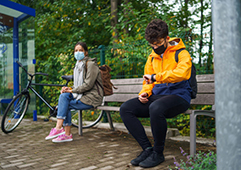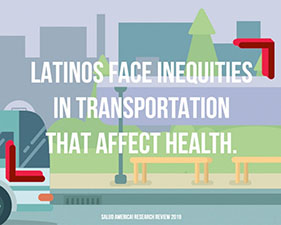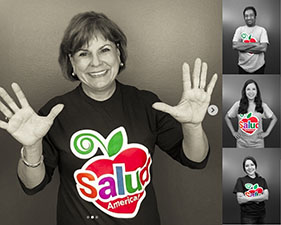Exported PDF file:

and poor health outcomes than non-Latino Whites.
| Latino | Non-Latino White | |
|---|---|---|
| Children in Poverty | ||
| Median Household Income | ||
| No High School Diploma | ||
| Uninsured Population | ||
| Teen Birth Rates (per 1,000 pop.) | ||
| Asthma Prevalence (state) | ||
| Infant Mortality (per 1,000 birth) | ||
| Mortality - Cancer (per 100,000 pop.) | ||
| Motor Vehicle Crash Death Rate (per 100,000 pop.) | ||
| Youth Obesity (state) |
Community groups that get Community Development Block Grant program funds have to do a community needs assessment every few years to identify lower-income people's needs. This can give local context for social and economic barriers that impact self-sufficiency and health.
Per the Affordable Care Act, tax-exempt hospitals have to do a community health needs assessment every three years and adopt an implementation strategy to meet the needs identified. These reports can provide an important local context into inequities in health outcomes.
Some communities do studies to assess racial and/or economic inequities in education, housing, transportation, economic opportunity, safety, justice, and health. This can give local context into inequities in living conditions.
ACEs, like abuse and neglect, are a root cause of many of today’s critical public health challenges.
We need leaders to screen for ACEs, recognize toxic stress as a biological health condition, and push for a robust toxic stress research agenda to identify biomarkers and develop confirmatory diagnostic criteria to screen patients for toxic stress.
There is little data on the symptoms and social, economic, and health consequences of inadequate transportation.
Similar to the National Nutrition Monitoring and Related Research Act of 1990, which led to measures to capture and monitor food insecurity, we need a national act to support the development a measure to collect data on and monitor transportation insecurity/precarity.
Learn more here. 
Guns and traffic crashes are the leading causes of death for American youth ages 1-19.
To address these issues, we need comprehensive and multi-layered public health approaches to define and monitor the problems and identify risk and protective factors, which means we need better data collection for violent child death.
Learn more here. 
- Diversity in clinical trials
- Clinical trial access
- Cancer health disparities
- Maternal and pregnancy health
- Mental health access
- ACEs and toxic stress
- Gun violence
- Traffic violence
- Transportation insecurity
- SDOH screening
- Infection control
- Access to federal aid programs
- Anti-racism policies
- Childcare deserts
- Climate change
Email this report to colleagues and community leaders; share it on social media;
and bring printed copies to school or community meetings.
Explore case studies and stories of successful change-makers.
Explore research and resources to help you build your case.
Email Salud America! at saludamerica@uthscsa.edu.
| Page | Indicator | Source |
|---|
Share on social!










